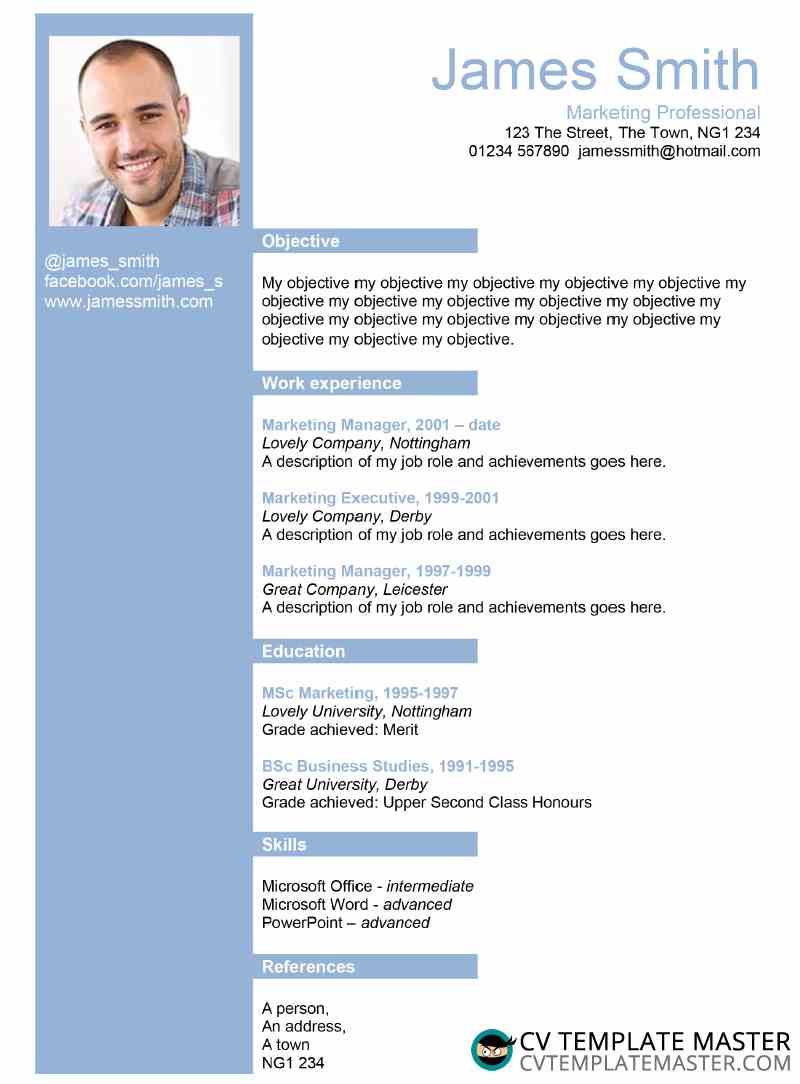Template details:

A lovely fresh CV layout with the option of a profile pic. The key here is to use a high quality printer and quality paper – this assures you of the best result.

3 things you should never put on your CV
Knowing what to exclude from your CV can be just as important as knowing what to include. With so much at stake it’s important to understand what could hinder your chances of getting an interview.
Certain sections are mandatory and would be expected by an employer. Your CV should typically contain a work history section, contact details, core skills, and so on. If your CV has just one of these sections missing, you are going to be instantly rejected.
The three items which shouldn’t be included on your CV don’t relate to sections. We’ve gone for a more subtle approach, and one which shouldn’t be ignored.
Here’s our top 3 list of things you should never put on your CV…
Irrelevant work experience
It doesn’t matter how amazing you were at serving burgers when you were 17. As proud as you may be of your performance, it may not be of interest to the employer. This is especially true if the role was 20 years ago!
Even though you shouldn’t remove work experience as gaps are a bad idea, you should still however keep this kind of info down to a minimum. Focus on the relevant roles which showcase the right skills and experience the employer is looking for.
Your last 2-3 roles are the most important to the employer. Anything beyond that would typically need to take a backseat, with the exception of roles which clearly demonstrate the same skills and/or contain outstanding achievements.
You may not realise it, but your work history section could be letting you down. To find out if this is the case, please read our article – Is the work history section of your CV losing you interviews?
Personal details
You don’t need to include your personal details on a CV, for instance marital status or religion. This information has no relevance to the role and cannot be requested from the employer.
You may find that you are judged on this information if you decide to include it and it’s really not worth taking the risk. Even though we’d like to think we live in a world where employers don’t discriminate, it does still happen every day and from your perspective it just isn’t worth the hassle.
You only need to provide your full name, professional title (optional), email address and contact number. Your date of birth, address, height, weight, eye colour – do not matter. Just provide accurate contact details and focus upon writing a professional CV.
Falsehoods
You should never lie on your CV. Even if it’s just a small one that you are confident will never come out – it can and most likely will!
Lying about past work experience, skills and especially qualifications is a big no-no. Taking that kind of risk could put your career in jeopardy. There’s a good chance that you get caught out during the interview, which is a sure fire way of losing any hope you had of a second interview or even the position.
If the employer hires you and then finds out you lied on your CV, there is a good chance you’ll be dismissed. Even if you don’t get fired you’ve probably ruined your chances of promotion further down the road.
For more information on the consequences of lying on your CV, please read this fantastic article – Lying on your CV: The Facts.